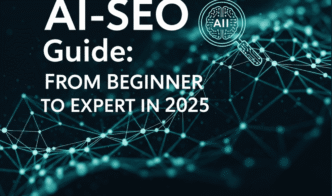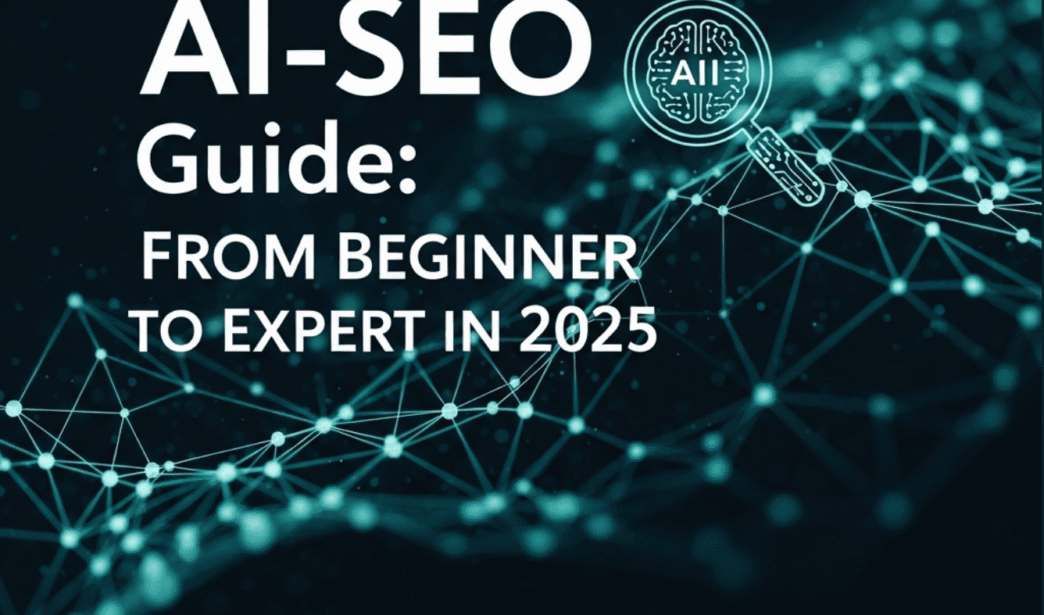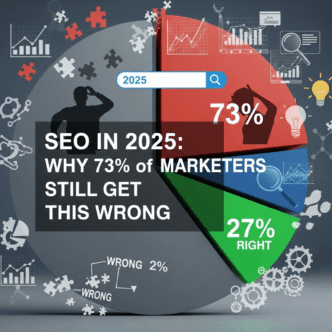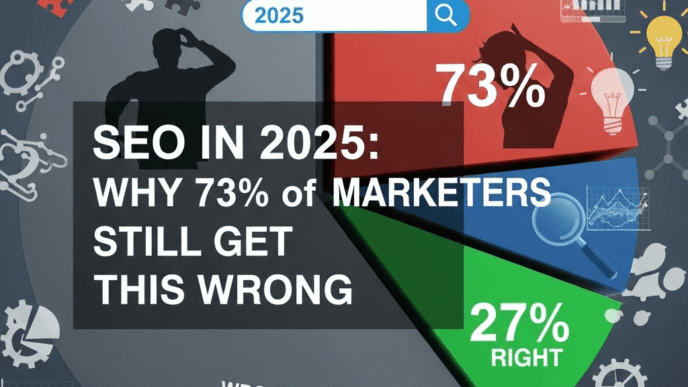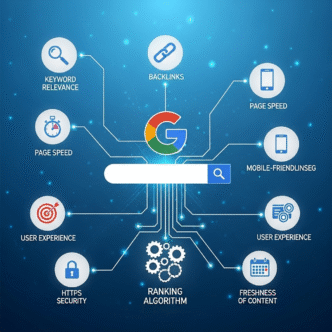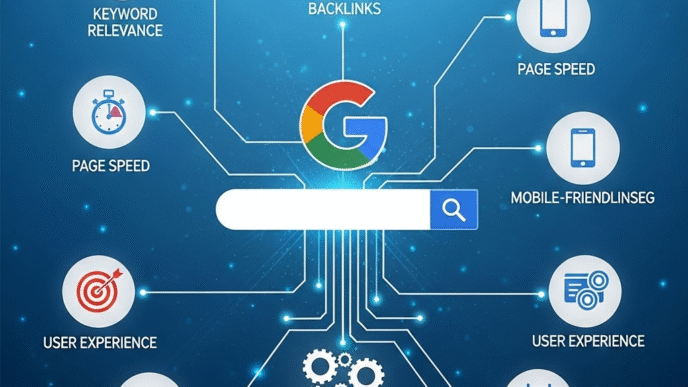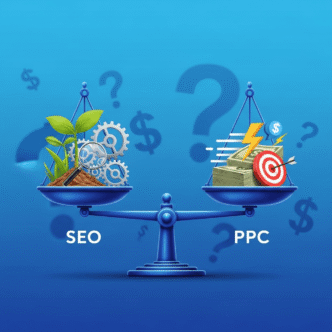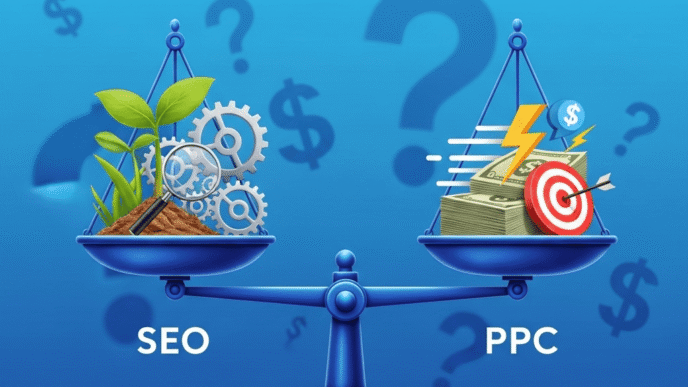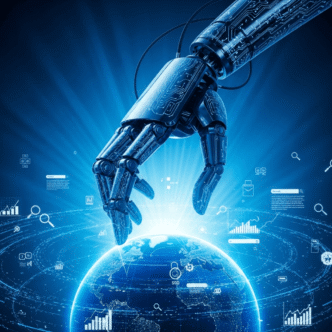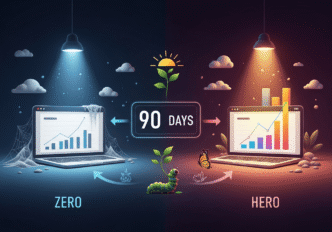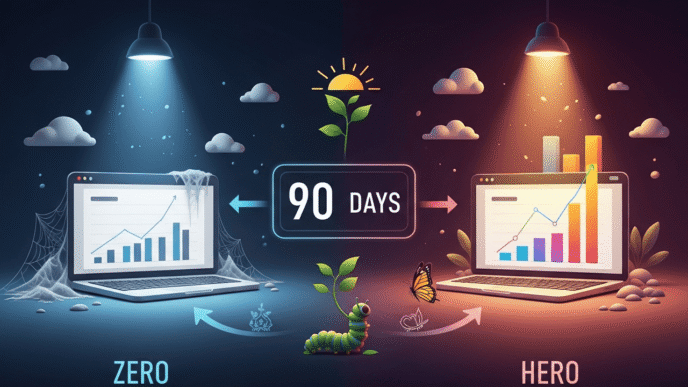Table of Contents
Toggle1. Introduction
Remember when you could stuff a webpage with “best pizza New York” 47 times and magically appear at the top of Google? Those days are as dead as dial-up internet. Search engines have evolved from simple keyword matchmakers into intelligent answer engines that actually understand what you’re looking for—not just what you typed.
AI-SEO is transforming how we approach search optimization faster than any algorithm update in Google’s history. While traditional SEO focused on gaming the system, AI-powered search is all about genuinely answering user questions and providing real value.
Here’s what you’ll discover in this guide: what AI-SEO actually means, why it’s reshaping the entire search landscape, and most importantly—how you can adapt your strategy to thrive in this new era. Ready to future-proof your SEO game? Let’s dive in.
2. What is AI-SEO?
Think of AI-SEO as the marriage between artificial intelligence and search engine optimization. It’s not just one thing—it’s actually two sides of the same revolutionary coin that’s changing how we find and share information online.
AI-SEO refers to the use of artificial intelligence in both search algorithms and SEO strategies. On one side, search engines like Google and Bing are getting smarter. On the other side, marketers are using AI tools to create better content and optimize more effectively.
2.1 The Two Sides of the AI-SEO Coin
Side 1: How Search Engines Use AI Google’s RankBrain, BERT, and MUM algorithms are like having a super-smart assistant that actually understands context and intent. Bing’s ChatGPT integration takes this even further, turning search into conversations.
Side 2: How Marketers Use AI for SEO From content generation tools like Jasper and Copy.ai to keyword clustering platforms like Surfer SEO, marketers now have AI-powered assistants for every aspect of optimization.
Here’s a simple way to think about it: Traditional SEO was like handing a librarian an index card with keywords written on it. AI-SEO is like having a conversation with a librarian who already knows your reading habits, understands exactly what you’re looking for, and can predict what you’ll want to read next.
2.2 Traditional SEO vs AI-SEO: What’s Really Changed?
| Aspect | Traditional SEO | AI-SEO |
|---|---|---|
| Keyword Research | Manual tools, exact match focus | AI-powered clustering, intent analysis |
| Content Creation | Human-only writing, gut feelings | AI-assisted research, data-driven optimization |
| Optimization | Static keyword density | Dynamic, real-time content suggestions |
| User Intent | Guesswork based on keywords | AI analyzes actual search behavior patterns |
| Personalization | One-size-fits-all content | AI adapts content to user preferences |
| Speed | Hours/days for analysis | Minutes for comprehensive insights |
| Accuracy | Human errors, biased decisions | Data-driven, pattern-recognition accuracy |
| Scalability | Limited by human resources | Unlimited scaling with AI automation |
Pro Tip: The biggest shift isn’t the technology—it’s the mindset. Stop thinking “How do I rank for keywords?” and start thinking “How do I provide the best answer to user questions?”
3. How Do Search Engines Use AI?
Search engines have basically become mind readers. They’re no longer just matching words on a page to words in a search query—they’re understanding meaning, context, and user intent in ways that seemed impossible just five years ago.
3.1 What is Natural Language Processing in Search?
Natural Language Processing (NLP) is the reason Google now understands that “apple stock” and “AAPL share price” mean the same thing. Instead of looking for exact keyword matches, AI analyzes the meaning behind words and phrases.
When you search “best laptop for students under $500,” the AI doesn’t just look for pages with those exact words. It understands you want:
- Budget-friendly computers
- Educational use cases
- Performance recommendations
- Price comparisons
3.2 How Does AI Personalize Search Results?
Every search you make teaches AI more about what you’re looking for. Google’s AI considers your search history, location, device, and even the time of day to show you more relevant results.
For example, if you search “pizza” at 7 PM on a Friday, you’ll see local restaurants with delivery options. Search the same term at 10 AM on a Tuesday, and you might see pizza recipes or cooking tips instead.
3.3 What Are AI-Powered SERP Features?
Those answer boxes, “People also ask” sections, and knowledge panels? They’re all curated by AI. Google’s systems scan millions of pages to extract the most relevant information and present it directly in search results.
Popular AI-Generated SERP Features:
- Featured snippets (position zero results)
- Knowledge panels
- “People also ask” boxes
- Image carousels
- Local pack results
- Shopping results
3.4 How is AI Changing Voice and Visual Search?
Voice search through Siri, Alexa, and Google Assistant relies heavily on AI to understand natural speech patterns and accents. Visual search tools like Google Lens use AI to identify objects, text, and even solve math problems from photos.
This shift means your content needs to be optimized for conversational queries (“Hey Google, what’s the best coffee shop near me?”) rather than just typed keywords (“coffee shop downtown”).
Pro Tip: Start optimizing for question-based queries and conversational language. AI-powered search engines love content that directly answers specific questions in a natural, human way.
4. How is AI Changing SEO Strategies?
The AI-SEO revolution isn’t just changing how search engines work—it’s completely transforming how smart marketers approach optimization. Gone are the days of manually researching keywords for hours or writing content based on gut feelings.
AI is becoming the ultimate SEO assistant, handling everything from content creation to technical audits. Let’s explore how each area of SEO is getting an AI-powered upgrade.
4.1 How Does AI Transform Content Creation and Optimization?
Creating content used to mean staring at a blank page for hours. Now, AI tools like ChatGPT, Jasper, and Copy.ai can generate topic ideas, create outlines, and even write first drafts in minutes.
But here’s the game-changer: AI doesn’t just create content—it optimizes it in real-time. Tools like Surfer SEO and Clearscope analyze top-ranking pages and suggest exactly which keywords and topics to include for better rankings.
Popular AI Content Tools:
- ChatGPT & Claude: Idea generation, outlines, first drafts
- Jasper & Copy.ai: Marketing copy and blog content
- Surfer SEO & Clearscope: Content optimization and keyword suggestions
- Grammarly: AI-powered editing and tone adjustments
4.2 What’s New in AI-Powered Keyword Research?
Traditional keyword research was like fishing with a single hook. AI-SEO keyword research is like using a smart net that automatically finds the best spots and catches exactly what you need.
AI tools now perform cluster analysis, grouping related keywords by search intent. Instead of targeting one keyword, you can optimize for entire topic clusters that search engines love.
Advanced AI Keyword Features:
- Intent classification (informational, commercial, navigational)
- Semantic keyword grouping
- Predictive search trend analysis
- Competitor gap analysis
- Voice search optimization suggestions
4.3 How Does AI Revolutionize Technical SEO?
Technical SEO used to require deep coding knowledge and manual site audits. AI-powered crawlers like those in Screaming Frog and DeepCrawl now automatically detect issues and even suggest fixes.
AI can spot patterns humans miss—like pages that load slowly only on certain devices or content that’s accidentally blocking search engines. Some tools even predict which technical issues are most likely to hurt your rankings.
AI Technical SEO Capabilities:
- Automated site health monitoring
- Core Web Vitals optimization
- Broken link detection and fixing
- Schema markup suggestions
- Mobile-first indexing analysis
4.4 What Role Does AI Play in User Experience Optimization?
AI is making websites smarter about what visitors actually want. Instead of showing the same content to everyone, AI-powered personalization tools can adapt your site based on user behavior, location, and preferences.
A/B testing with AI takes this further—instead of manually testing two versions, AI can continuously optimize elements like headlines, CTAs, and layouts based on real user data.
Pro Tip: Don’t let AI replace your creativity—use it to handle the heavy lifting so you can focus on strategy and genuine value creation. The best AI-SEO results come from combining AI efficiency with human insight.
5. What Are the Key Benefits of AI-SEO?
If you’re still doing SEO the old-fashioned way, you’re basically bringing a calculator to a computer science exam. AI-SEO doesn’t just make things easier—it makes them faster, smarter, and more effective than ever before.
The benefits go way beyond just saving time. AI is fundamentally changing what’s possible in search optimization, giving even small businesses access to enterprise-level capabilities.
5.1 Lightning-Fast Data Processing and Insights
Remember spending entire afternoons analyzing competitor keywords or manual crawling through search console data? AI can process that same information in minutes and spot patterns you’d never notice.
Tools like SEMrush and Ahrefs now use AI to analyze millions of search results instantly. What used to take a team of analysts weeks can now happen while you grab your morning coffee.
5.2 Precision Targeting Through Intent Analysis
AI-SEO tools don’t just tell you what people search for—they reveal why they’re searching. This intent analysis means you can create content that matches exactly what users want at each stage of their journey.
Instead of guessing whether someone searching “best running shoes” wants to buy or just learn, AI can classify search intent with 90%+ accuracy.
5.3 Content Personalization at Scale
Personalizing content for thousands of visitors used to be impossible without a massive team. AI changes that game completely. You can now create dynamic content that adapts to user behavior, location, and preferences automatically.
E-commerce sites using AI personalization see average conversion rate increases of 15-25%, according to recent studies.
Current AI-SEO Adoption Statistics:
- 67% of people see an improvement in content quality when using AI
- 47% of marketers are already implementing AI SEO tools to improve search efficiency
- 65% of businesses report improved SEO results with AI, while 67% see higher content quality
- Websites using AI for SEO see up to a 70% increase in organic traffic
5.4 Predictive Power to Stay Ahead of Trends
The best part about AI-SEO? It’s not just reactive—it’s predictive. AI can analyze search patterns and predict which topics will trend before your competitors even notice them.
This means you can create content for emerging keywords while the competition is still low, giving you a massive head start.
Pro Tip: The biggest benefit isn’t any single feature—it’s how AI connects everything. Your keyword research informs your content creation, which feeds into your technical optimization, creating a seamless AI-SEO workflow.
6. What Are the Potential Risks and Pitfalls of AI-SEO?
Before you go all-in on the AI-SEO revolution, let’s talk about the elephant in the room. Like any powerful tool, AI can be incredibly helpful or spectacularly destructive—depending on how you use it.
The internet is already flooded with generic AI content that reads like it was written by a very polite robot. Don’t become part of the problem.
6.1 The Over-Automation Trap: When AI Creates Generic Content
The biggest risk with AI-SEO tools is thinking they can replace human creativity and expertise. When everyone uses the same AI tools with similar prompts, the internet becomes a sea of identical, generic content.
Google’s algorithms are getting better at detecting and penalizing obviously AI-generated content that lacks original insights or human expertise. The solution? Use AI as your research assistant, not your replacement.
Warning Signs of Over-Automation:
- Content that sounds robotic or overly formal
- Articles that lack unique insights or personal experience
- Blog posts that could apply to any industry with minor word changes
- Missing brand voice and personality
6.2 Ethical Concerns: Plagiarism and Misinformation Risks
AI tools sometimes “borrow” content from existing sources without proper attribution. Even worse, they can confidently state completely false information that sounds credible.
This creates serious risks for your brand reputation and search rankings. Google’s E-E-A-T guidelines (Experience, Expertise, Authoritativeness, Trust) specifically target content that lacks accuracy and credibility.
6.3 Algorithm Dependence: The Risk of Sudden Traffic Drops
When you optimize purely for AI algorithms, you’re essentially putting all your eggs in one very smart but unpredictable basket. Algorithm updates can wipe out traffic overnight if your entire strategy depends on gaming the system.
The 2023 Google Helpful Content Update specifically targeted sites that over-relied on AI-generated content, causing traffic drops of 50-90% for some websites.
AI-SEO Risk Statistics:
- 85.56% of SEOs believe that it’s likely that generative AI will take over SEO jobs in the future
- 58.5% of Google searches in the U.S. result in zero clicks to websites
- 65.14% of professionals think that the biggest concerns about using generative AI are content quality and authenticity
- Google’s AI Overviews reduced organic CTR by an estimated 20–40%
6.4 The Missing Human Touch: What AI Can’t Replicate
AI-SEO tools are brilliant at data analysis and pattern recognition, but they can’t replicate human creativity, empathy, or genuine expertise. They don’t have personal experiences, emotional intelligence, or the ability to truly understand your audience’s pain points.
The most successful AI-SEO strategies combine AI efficiency with irreplaceable human elements like:
- Personal experience and storytelling
- Industry expertise and unique insights
- Emotional connection and brand personality
- Creative problem-solving and innovation
Pro Tip: Think of AI as your incredibly smart intern—great at research and first drafts, but everything needs your expert review and human touch before it goes live. The goal is AI-assisted content, not AI-generated content.
7. How Do You Get Started with AI-SEO as a Beginner?
Jumping into AI-SEO can feel like trying to drink from a fire hose—there are so many tools, strategies, and “experts” telling you what to do. But here’s the truth: you don’t need to master everything at once.
The key is starting with a solid foundation and gradually building your AI-powered toolkit. Think of it as learning to drive—you master the basics first, then add advanced techniques over time.
7.1 Step 1: Master Traditional SEO Fundamentals First
Before you start using AI to optimize content, you need to understand what good optimization actually looks like. AI-SEO tools are incredibly powerful, but they’re useless if you don’t know the principles behind effective SEO.
Start with the fundamentals: keyword research, on-page optimization, technical SEO basics, and content strategy. Free resources like Google’s SEO Starter Guide and Moz’s Beginner’s Guide are perfect starting points.
Essential SEO Basics to Learn:
- How search engines crawl and index websites
- Keyword research and search intent
- On-page optimization (title tags, meta descriptions, headers)
- Basic technical SEO (site speed, mobile-friendliness)
- Content creation for users, not just search engines
7.2 Step 2: Start with Free AI Tools for Basic Tasks
Once you understand SEO fundamentals, dip your toes into AI-SEO with free tools. ChatGPT is perfect for creating content outlines and brainstorming keyword ideas. Google Search Console’s insights feature uses AI to highlight your biggest opportunities.
Don’t jump into expensive tools right away. Master the free options first—you’ll be surprised how much you can accomplish without spending a dime.
Best Free AI-SEO Tools for Beginners:
- ChatGPT: Content outlines, topic ideas, meta descriptions
- Google Search Console: Performance insights and optimization suggestions
- Google Trends: AI-powered trend analysis and keyword discovery
- AnswerThePublic: Question-based keyword research
- Ubersuggest (free tier): Basic keyword and content ideas
7.3 AI-SEO Tools Comparison: Free vs Paid Options
| Tool Category | Free Options | Paid Options | Best For |
|---|---|---|---|
| Content Creation | ChatGPT, Claude | Jasper, Copy.ai, Writesonic | Scaling content production |
| Keyword Research | Google Trends, Ubersuggest (limited) | SEMrush, Ahrefs, Surfer SEO | Deep competitive analysis |
| Content Optimization | Google Search Console | Clearscope, MarketMuse, Frase | Real-time optimization |
| Technical SEO | Google PageSpeed Insights | Screaming Frog, DeepCrawl | Large site auditing |
| Analytics | Google Analytics 4 | BrightEdge, Conductor | Enterprise reporting |
| All-in-One | Limited free tiers | SEMrush, Ahrefs | Complete SEO workflow |
7.4 Step 3: Use AI for Research, Keep Human Control of Creation
This is where most beginners go wrong—they let AI write entire articles and wonder why their content feels generic. The sweet spot is using AI-SEO tools for research and idea generation, then adding your unique insights and expertise.
Let AI handle the heavy lifting of data analysis and first drafts, but always edit with your human perspective. Your personal experience and expertise are what make content valuable.
Effective AI-Human Workflow:
- Use AI for keyword research and competitor analysis
- Generate content outlines with AI assistance
- Write first drafts with AI help, but add personal insights
- Edit heavily to add your unique voice and expertise
- Fact-check everything—AI can make confident mistakes
7.5 Step 4: Track Performance and Adjust Your Strategy
AI-SEO isn’t a “set it and forget it” strategy. You need to constantly monitor what’s working and adjust your approach based on real data, not assumptions.
Set up proper tracking from day one. Google Analytics, Search Console, and your chosen AI tools should all be connected to give you a complete picture of your performance.
Key Metrics to Monitor:
- Organic traffic growth and keyword rankings
- Content engagement (time on page, bounce rate)
- Conversion rates from organic traffic
- Featured snippet and SERP feature captures
- Content performance across different AI-optimized pieces
7.6 Step 5: Stay Updated—AI Technology Evolves Rapidly
The AI-SEO landscape changes faster than fashion trends. New tools launch monthly, search algorithms get smarter, and best practices evolve constantly. What worked six months ago might be completely outdated today.
Follow reputable SEO news sources, join communities, and never stop experimenting. The marketers who succeed in AI-SEO are the ones who stay curious and adaptable.
Pro Tip: Start small and scale gradually. Master one AI tool completely before adding another to your toolkit. It’s better to be excellent with a few tools than mediocre with many.
8. What Does the Future of AI-SEO Look Like?
The AI-SEO revolution is just getting started. We’re currently in the “early adopter” phase, which means the biggest opportunities are still ahead of us. But the changes coming will make today’s AI tools look like ancient history.
Buckle up—the next five years will transform search and SEO more than the previous twenty combined.
8.1 AI as Your SEO Co-Pilot: Complete Integration
Imagine your CMS automatically optimizing content as you write, your analytics predicting traffic changes before they happen, and your website adapting its structure based on user behavior patterns. That’s not science fiction—it’s the very near future of AI-SEO.
Major platforms like WordPress, Shopify, and HubSpot are already integrating AI directly into their systems. Soon, AI-powered optimization will be as standard as spell-check.
Coming AI Integrations:
- Real-time content optimization while writing
- Automatic technical SEO fixes and monitoring
- Predictive analytics with actionable recommendations
- Voice-activated SEO management and reporting
- AI-powered competitor monitoring and alerts
Current AI Search Statistics:
- 13.14% of all queries triggered AI Overviews in March 2025 (up from 6.49% in January 2025)
- 63% of respondents reported that Google AI Overviews have positively impacted organic traffic, visibility, or rankings since its rollout
- 74% of problem-solving queries trigger AI Overviews
- 88.1% of queries that trigger an AI Overview are informational
8.2 The Rise of AI-Generated Search Summaries
Google’s Search Generative Experience (SGE) and Bing’s ChatGPT integration are just the beginning. Search results are shifting from lists of links to AI-generated summaries that directly answer questions.
This means traditional “click-through” SEO is becoming less important than “visibility within AI summaries” SEO. Your content needs to be source material for AI answers, not just a destination.
8.3 E-E-A-T Becomes Even More Critical
As AI-generated content floods the internet, search engines are doubling down on E-E-A-T signals (Experience, Expertise, Authoritativeness, Trustworthiness). AI-SEO success will increasingly depend on proving human expertise and real-world experience.
Content creators who can demonstrate genuine expertise and provide unique insights will have massive advantages over those relying purely on AI generation.
Future E-E-A-T Factors:
- Verified author credentials and expertise
- Real customer reviews and testimonials
- Original research and data
- Personal experience and case studies
- Brand authority and trust signals
8.4 The Possibility of “Search Without Search Engines”
Here’s the big question: what happens when AI assistants become so good that people stop using search engines altogether? Instead of googling “best restaurants near me,” they’ll just ask their AI assistant to make a reservation.
This shift could fundamentally change how businesses approach online visibility. AI-SEO might evolve into “AI Assistant Optimization”—making sure your business is the one AI recommends.
Pro Tip: The future belongs to content creators who can prove human expertise while leveraging AI efficiency. Start building your authority and unique insights now—they’ll become your biggest competitive advantage.
9. Conclusion: Your AI-SEO Journey Starts Now
AI-SEO isn’t just the future of search optimization—it’s the present. While others are still debating whether AI will change SEO, smart marketers are already using these tools to create better content, rank higher, and serve their audiences more effectively.
Here’s what you need to remember: AI-SEO success isn’t about replacing human creativity with artificial intelligence. It’s about combining AI efficiency with human expertise to create something neither could achieve alone.
Key Takeaways for Your AI-SEO Success
The most important lesson? Start with solid SEO fundamentals, then gradually add AI tools to amplify your efforts. Use AI for research, data analysis, and first drafts—but always add your unique human perspective and expertise.
Remember that search engines are getting smarter about detecting generic AI content. The winners will be those who use AI to enhance their human insights, not replace them.
Don’t get overwhelmed by the rapid pace of change. Master one AI tool at a time, focus on providing genuine value to your audience, and stay curious about new developments.
Ready to Experiment? Start Small, Think Big
The best time to start your AI-SEO journey was yesterday. The second-best time is right now. Begin with free tools like ChatGPT for content outlines or Google Search Console for insights.
Test, measure, adjust, and gradually expand your AI toolkit as you become more comfortable. The marketers who start experimenting today will have massive advantages over those who wait for “perfect” tools or strategies.
Join the Conversation: What’s Your AI-SEO Vision?
The AI-SEO landscape is evolving so rapidly that today’s best practices might be outdated by next month. That’s why community and continuous learning are essential.
How do you think AI will change SEO in the next 5 years? Will we still be optimizing for traditional search engines, or will AI assistants completely transform how people find information? Share your thoughts and join the conversation—the future of search is being written by pioneers like you.
Final Pro Tip: The goal isn’t to become an AI expert overnight—it’s to become the kind of content creator who uses AI to serve your audience better than ever before. Start experimenting, keep learning, and remember that the best AI-SEO strategy is the one that puts human value first.
Common AI-SEO Mistakes to Avoid
Even with all the best intentions, many beginners fall into predictable AI-SEO traps that can hurt their rankings and waste valuable time. Learning from these common mistakes will save you months of frustration and help you build a sustainable AI-powered strategy from day one.
Over-Relying on AI-Generated Content Without Human Review
The biggest mistake? Publishing AI content without adding your expertise and personality. Search engines are getting incredibly good at detecting generic, AI-generated content that lacks original insights.
Warning Signs You’re Over-Automating:
- Your content sounds like it could be about any industry with minor changes
- Missing personal experiences, case studies, or unique data
- Robotic tone that lacks your brand’s personality
- No original research or expert opinions
Ignoring E-E-A-T Guidelines in the AI Era
Google’s E-E-A-T (Experience, Expertise, Authoritativeness, Trustworthiness) guidelines are more important than ever. AI content often fails these tests because it lacks real-world experience and genuine expertise.
Using AI Keywords Without Understanding Search Intent
AI tools can generate thousands of keyword suggestions, but they can’t understand your audience’s true needs. Many marketers stuff AI-suggested keywords into content without considering whether they actually serve user intent.
Pro Tip: Use AI for keyword discovery, but always validate suggestions against your actual customer questions and pain points. The best keywords are the ones your audience actually uses, not just what AI tools suggest.
Frequently Asked Questions (FAQ)
Will AI Replace SEO Professionals?
No, AI-SEO tools are making SEO professionals more effective, not obsolete. While 85.56% of SEOs believe that generative AI might take over some SEO jobs in the future, the reality is that AI enhances human capabilities rather than replacing them. The most successful SEO professionals will be those who master AI tools while providing strategic thinking and creative problem-solving that AI cannot replicate.
Is AI-Generated Content Bad for SEO?
AI-generated content isn’t inherently bad for SEO, but low-quality, generic AI content definitely hurts your rankings. 67% of people see an improvement in content quality when using AI, but only when it’s properly edited and enhanced with human expertise. The key is using AI as a starting point, then adding your unique insights and experience.
How Much Does AI-SEO Cost for Beginners?
You can start AI-SEO with completely free tools like ChatGPT, Google Search Console, and Google Trends. Paid tools typically range from $29-99/month for basic plans, scaling up to $500+ for enterprise solutions. Most beginners should start with free tools and gradually invest in paid options as they see results.
What’s the Difference Between AI Overviews and Featured Snippets?
AI Overviews are AI-generated summaries that appear at the top of search results, while featured snippets are excerpts pulled directly from existing web pages. AI Overviews appeared in 30% of Google search results in January 2025, and they’re growing rapidly. Both can drive visibility, but AI Overviews are synthesized from multiple sources rather than highlighting a single page.
Should I Worry About Zero-Click Searches?
While 58.5% of Google searches in the U.S. result in zero clicks to websites, this doesn’t mean AI-SEO is pointless. Focus on bottom-of-funnel keywords where users are ready to take action, and optimize for being cited in AI summaries to build brand authority even when users don’t click through.
How Often Should I Update My AI-SEO Strategy?
AI-SEO evolves rapidly, so review your strategy quarterly and stay updated on major algorithm changes. 13.14% of all queries triggered AI Overviews in March 2025, up from 6.49% in January 2025, showing how quickly the landscape changes. Subscribe to reputable SEO news sources and test new tools regularly.
Can Small Businesses Compete with AI-SEO?
Absolutely! AI-SEO actually levels the playing field by giving small businesses access to enterprise-level capabilities. 65% of businesses report improved SEO results with AI, and many of the most effective tools are free or affordable. Focus on serving your local market and niche expertise where you can outcompete larger competitors.
🚀 Interactive AI-SEO Mastery Guide
Your Complete Journey from Beginner to AI-SEO Expert
Progress: 0% Complete
🎯 Your Interactive Learning Path
▼Click each step to mark as completed and track your progress!
SEO Fundamentals
Master traditional SEO basics
Weeks 1-2AI Tools Discovery
Explore free AI-SEO tools
Weeks 3-4Content Creation
Create AI-optimized content
Month 2Advanced Strategies
Scale and optimize
Month 3+🛠️ AI-SEO Tool Recommendation Engine
▼Find Your Perfect AI-SEO Tools
📊 AI-SEO ROI Calculator
▼Calculate Your Potential AI-SEO Returns
Current Metrics
AI-SEO Implementation
🧠 Test Your AI-SEO Knowledge
▼📈 Interactive AI-SEO Statistics
▼Click each statistic to learn more!
Improved Content Quality
Marketers Using AI-SEO
Queries with AI Overviews
Traffic Increase Potential
🔮 Interactive Future Timeline
▼Click each year to explore future predictions!
AI Overviews Expansion
AI-generated summaries dominate search results
Details: Google's AI Overviews will appear in 30%+ of search results. Content creators must optimize for being cited in AI summaries rather than just traditional click-through SEO.
Action Required: Focus on creating authoritative, well-cited content that AI can confidently reference.
Real-time AI Optimization
CMS platforms integrate live AI optimization
Details: WordPress, Shopify, and other major platforms will have built-in AI that optimizes content as you write, suggests improvements, and automatically implements technical SEO fixes.
Action Required: Learn to work alongside AI optimization tools rather than against them.
Voice & Visual Search Dominance
AI assistants become primary search interface
Details: Voice and visual search will account for 50%+ of all searches. Traditional text-based queries will become secondary to conversational AI interactions.
Action Required: Optimize content for natural language queries and conversational search patterns.
Search Without Search Engines
AI assistants replace traditional search
Details: People will ask AI assistants to complete tasks directly rather than searching for information. "AI Assistant Optimization" will replace traditional SEO.
Action Required: Build relationships with AI systems and focus on being the go-to source for AI recommendations.
📚 Want More AI-SEO Insights?
Visit SEOProJournal.comYour go-to source for the latest SEO strategies, AI tools, and digital marketing insights
Need Help?
• Click section headers to expand
• Complete roadmap steps to track progress
• Use tools to get personalized recommendations
• Take the quiz to test your knowledge

